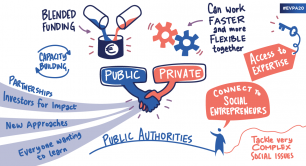Dropping egos, taking risks: Five ways ‘next-generation’ leaders are doing things differently
Much hope is invested in younger generations to solve the major challenges of the future – and that’s just as true in business and investment, where so-called ‘next generation’ leaders appear to be flocking towards more responsible ways of turning a profit.
But are they really so different to their parents and grandparents?
The question was put to industrial leader Julia Thiele-Schürhoff and foundation head Kirsten Ottens earlier today in a session of the EVPA annual conference.
Thiele-Schürhoff, 49, is a board member of the German brake systems manufacturer Knorr-Bremse, which her father acquired in 1985. She created the company’s social responsibility division in 2008 (at a time, she said, when sustainability was seen as something only for “do-gooders”) and ran it until 2014. She still sees her role as creating more awareness of sustainability issues, and feels “not only the responsibility” – in part due to her family wealth – but “also the possibility” to change things.
Ottens (who describes herself as ‘Generation X’ – usually understood as being born between 1965 and 1980), is the director of the Netherlands-based ING Foundation, which supports people in digital inclusion, financial health and job opportunities.
Read on for their take on leadership.
1. A new context
While the post-war generation was focused on rebuilding, today it’s more about sustaining what we’ve got – and our planet, said Thiele-Schürhoff. It’s also more evident now where the problems are. “We just need to put our will into solving them,” she added.
In the age of information, social and environmental issues no longer feel so far removed, said Ottens, while new technologies were allowing a raft of new solutions to emerge and appealing to a generation that has grown up more exposed to data and tech.
It’s not so much about ego. I don’t need a big golden sign on a project saying who financed this. It’s about wanting to change things
2. Lifelong impact
The causes that motivate action have not changed much, said Ottens: health always was “the big topic” and that’s unlikely to change, because it’s so personal.
“But I think the way generations go about it is different. I think older generations were a bit more about making money during their lifetime and then towards the end, wondering what contribution can I make to society with that money?” For younger generations the idea of contributing is more entwined with their professional and personal lives. They’re also thinking not just about giving money, but about contributing in terms of talent, knowledge and networks.
Another buzzword, she added, was ‘hands-on’: “That’s very significant… they want to be involved.”
3. Less ego-driven
If the philanthropy of previous generations tended to be based on personal interests or a strong emotional tie, said Thiele-Schürhoff, younger people today were much more systematic. "We try to focus on the challenges and find solutions on a systematic basis. I think that’s a big difference,” she said.
That is good news for collaboration. “It’s not so much about ego. I don’t need a big golden sign on a project saying who did it or who financed this. It’s about wanting to change things, or contribute to a better world for my children, for all children.”
4. More appetite for risk
To tackle knotty problems, you have to accept some risk. “I think that’s necessary to come up with new ideas and to really solve things for the long-term,” said Ottens. “I think the risk appetite has already grown in my generation and will in generations to come. That’s going to be valuable. We have to be willing to make mistakes, be transparent about what went right and what went wrong, learn from it and move on quickly to the next steps.”
5. Diversity is a “no-brainer”
While older board members and CEOs still struggle with diversity, this is “a no-brainer” for their successors, said Ottens. “I think the next generations will solve that... It comes way more naturally to them. I really believe that if we have a diverse group of people in places where decisions are made, that’s also going to move us forwards.
“That's one of the most exciting things I see in the generations after mine.”
All hands on deck
It’s easy to pin hopes on the energy of youth to change things – but both speakers emphasised that we needed all generations to take responsibility.
“The best way to go is probably to be aware of the specific talents or [tools] that certain generations bring, and combine them,” said Ottens. “I think we all know now that nobody is going to solve it by themselves.”
And Thiele-Schürhoff emphasised that the task of spreading awareness of social and environmental issues wasn’t just up to business leaders. “If you’re a teacher, a professor, an impact investor, a conference organiser. I would ask all of you: create a circle within your friends, find little pieces where you can get engaged. Then we’re all role models.”
Illustration by Christopher Malapitan
Thanks for reading our stories. As an entrepreneur or investor yourself, you'll know that producing quality work doesn't come free. We rely on our subscribers to sustain our journalism – so if you think it's worth having an independent, specialist media platform that covers social enterprise stories, please consider subscribing. You'll also be buying social: Pioneers Post is a social enterprise itself, reinvesting all our profits into helping you do good business, better.





